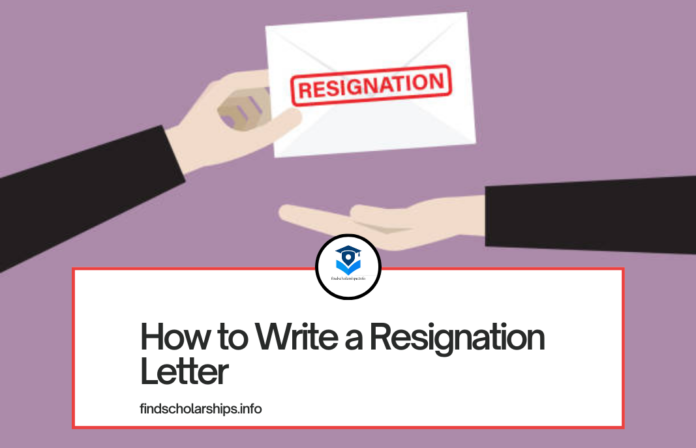How to Write a Resignation Letter; Writing a resignation letter can be a straightforward process if you follow the right steps and include essential elements.
Why a Resignation Letter is Important
A resignation letter is a formal way to notify your employer of your intent to leave your current position. It serves several purposes:
- Documentation: Provides a written record of your intention to resign.
- Professionalism:** Demonstrates your professionalism and maintains a positive relationship with your employer.
- Transition: Helps facilitate a smooth transition and allows your employer to plan for your departure.
What to Include in Your Resignation Letter
Your resignation letter should be clear, concise, and include the following key elements:
- Date: The date you are writing the letter.
- Recipient’s Information: The name and title of your supervisor or HR manager.
- Notice of Resignation: A clear statement that you are resigning from your position.
- Last Working Day: The date of your last day of work, ensuring you provide adequate notice (typically two weeks).
- Gratitude: A brief expression of gratitude for the opportunities you’ve had.
- Transition Offer: An offer to help with the transition process.
- Signature: Your signature to authenticate the document.
Step-by-Step Guide to Writing a Resignation Letter
Step 1: Start with a Professional Heading
Include your name, address, and the date at the top of the letter.
Step 2: Address the Recipient
Use a formal salutation such as “Dear [Supervisor’s Name],”
Step 3: State Your Intention to Resign
Clearly state that you are resigning from your position.
- Example: “I am writing to formally resign from my position as [Your Job Title] at [Company Name].”
Step 4: Provide Your Last Working Day
Mention your last working day, ensuring it aligns with your notice period.
- Example: “My last working day will be [Date], providing a two-week notice period.”
Step 5: Express Gratitude
Show appreciation for the opportunities and experiences you’ve had.
- Example: “I am grateful for the opportunities I have had during my time at [Company Name].”
Step 6: Offer to Assist with the Transition
Offer your assistance to make the transition smoother.
- Example: “I am willing to help with the transition process to ensure a smooth handover of my responsibilities.”
Step 7: Close with a Professional Sign-Off
End your letter with a professional closing, such as “Sincerely,” followed by your signature.
Resignation Letter Templates
Simple Resignation Letter Template
“`
[Your Name]
[Your Address]
[City, State, Zip Code]
[Email Address]
[Today’s Date]
[Supervisor’s Name]
[Company Name]
[Company Address]
[City, State, Zip Code]
Dear [Supervisor’s Name],
I am writing to formally resign from my position as [Your Job Title] at [Company Name]. My last working day will be [Date], providing a [Notice Period] notice period.
I am grateful for the opportunities I have had during my time at [Company Name] and appreciate all the support and guidance you have provided.
I am willing to help with the transition process to ensure a smooth handover of my responsibilities.
Sincerely,
[Your Name]
“`
Detailed Resignation Letter Template
“`
[Your Name]
[Your Address]
[City, State, Zip Code]
[Email Address]
[Today’s Date]
[Supervisor’s Name]
[Company Name]
[Company Address]
[City, State, Zip Code]
Dear [Supervisor’s Name],
I am writing to formally resign from my position as [Your Job Title] at [Company Name]. My last working day will be [Date], providing a [Notice Period] notice period.
Working at [Company Name] has been a rewarding experience, and I am thankful for the professional growth and support provided during my tenure. I have learned a great deal and have enjoyed working with such a dedicated team.
I am committed to ensuring a smooth transition and am available to assist in training my replacement or completing any outstanding projects. Please let me know how I can be of help during this period.
Thank you again for the opportunities and experiences. I look forward to staying in touch.
Sincerely,
[Your Name]
“`
Tips for Writing a Professional Resignation Letter
- Be Concise: Keep your letter brief and to the point.
- Maintain Positivity: Focus on positive experiences and express gratitude.
- Offer Assistance: Be willing to help with the transition process.
- Proofread: Check for any spelling or grammatical errors before sending.
Common Mistakes to Avoid
- Being Negative: Avoid negative comments about your job or colleagues.
- Lack of Notice: Ensure you provide sufficient notice as per your contract or company policy.
- Informal Language: Keep your language professional and formal.
- Omitting Key Details: Include all necessary information, such as your last working day and contact details.
Key Takeaways
- A resignation letter is a formal notification of your intent to leave a job.
- It should include the date, recipient’s information, your intention to resign, your last working day, gratitude, and an offer to assist with the transition.
- Use professional language and maintain a positive tone.
- Providing adequate notice and offering to help with the transition is crucial for a smooth departure.
Final Thoughts
Writing a resignation letter can be a straightforward process if you follow the right steps and include essential elements. By maintaining professionalism and expressing gratitude, you can leave your current job on a positive note. Use the provided templates and tips to ensure your resignation letter is effective and well-received.
For more advice and resources on professional communication, explore our other articles in the Recommendation Letters category. Good luck with your future endeavors!



